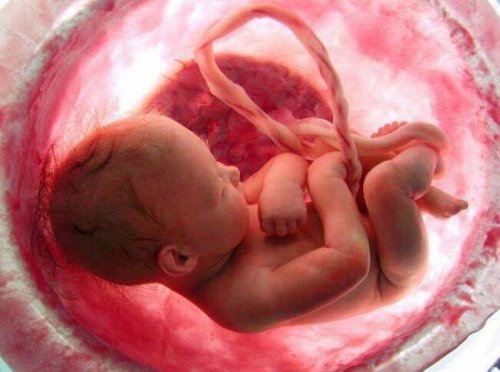How an Aging Placenta Affects the Baby

As the name suggests, an aging placenta is one where a series of changes have occurred prematurely as a result of a “prolonged life span.” It also has another name, early maturation of the placenta, which may help you understand what it is a little better. In addition, it’s important to note that it’s not dangerous in all cases.
In today’s article, we’ll share some of the most common doubts people have about this condition. If you’re interested in learning more, keep reading!
What’s a placenta?

The placenta is a specialized organ that only exists during pregnancy. Therefore, women don’t have a placenta for the majority of their lives. It develops on one of the inner walls of the uterus and is closely related to both the baby and the mother.
This organ has multiple functions, but these are its general ones: respiration, nutrition, metabolism, and hormone production. Without a well-developed and functional placenta, your baby’s growth may be in jeopardy.
Keep reading: Your Baby’s Weight During Pregnancy
What’s an aging placenta?
This term isn’t used very often, since it doesn’t refer to a specific condition. Instead, it refers to structural changes in the organ that have an influence on your baby’s growth.
Doctors can only detect an aging placenta with an echosonogram. Doctors will also use a diagnostic scale (called the Grannum scale) to determine changes that could influence the development of the pregnancy. These are some of the changes they look out for:
- The appearance of microcalcifications in blood vessels.
- Changes in the number and size of the veins with structures called placental cotyledons.
These changes are generally abnormal in patients less than 34 weeks pregnant. However, the course of pregnancy can lead to these alterations in later weeks.
Causes
Doctors don’t know exactly why some women develop this condition and others don’t. However, something that greatly influences a woman’s risk of suffering complications in the future is maternal comorbidities.
Diseases that affect the cardiovascular system are some of these conditions. For example. high blood pressure, metabolic or kidney diseases can play a role in the appearance of an aging placenta.
Consequences for the baby
Based on this research, an aging placenta may have something to do with some degree of placental insufficiency. That term refers to the placenta’s inability to fulfill its functions. The most direct consequence of this condition is the inadequate growth of the future baby.
That could be the result of changes such as intrauterine growth restriction (IUGR) and problems with the volume of amniotic fluid, especially its decrease.
Can you treat an aging placenta?
The treatment that doctors usually carry out depends on the mother’s condition, the associated risk factors, and the growth of the baby. If that’s all in order at the time of the consultation, the doctor will usually want to wait and see how the pregnancy evolves. As we previously mentioned, an aged placenta isn’t an emergency.
However, the doctor may also suggest some lifestyle changes and more frequent doctor visits.
On the other hand, if the doctor finds that your intrauterine development is poor, they may suggest that you have the baby prematurely. Even though the baby would be born a few weeks early, this would prevent any more serious complications from developing.
Discover: Basic Nutrients for a Healthy Pregnancy
When to see a doctor

An aged placenta usually won’t cause specific symptoms in mothers, which is why we recommend going to regular prenatal consultations. In many of these visits, the doctor will conduct an echosonogram in order to look for this condition as well as other changes.
During the first months of a normal pregnancy, going for a monthly visit should be sufficient. However, as the weeks progress into the last trimester, these consultations and echosonograms may become more regular. Remember to never miss your appointments!
An aging placenta isn’t always dangerous
As we mentioned before, this condition doesn’t have to mean a change in the course of your pregnancy. Also, since this condition can only be diagnosed through an ultrasound, you should see your doctor regularly. They’ll be able to tell you the next steps to take if they do detect this alteration.
As the name suggests, an aging placenta is one where a series of changes have occurred prematurely as a result of a “prolonged life span.” It also has another name, early maturation of the placenta, which may help you understand what it is a little better. In addition, it’s important to note that it’s not dangerous in all cases.
In today’s article, we’ll share some of the most common doubts people have about this condition. If you’re interested in learning more, keep reading!
What’s a placenta?

The placenta is a specialized organ that only exists during pregnancy. Therefore, women don’t have a placenta for the majority of their lives. It develops on one of the inner walls of the uterus and is closely related to both the baby and the mother.
This organ has multiple functions, but these are its general ones: respiration, nutrition, metabolism, and hormone production. Without a well-developed and functional placenta, your baby’s growth may be in jeopardy.
Keep reading: Your Baby’s Weight During Pregnancy
What’s an aging placenta?
This term isn’t used very often, since it doesn’t refer to a specific condition. Instead, it refers to structural changes in the organ that have an influence on your baby’s growth.
Doctors can only detect an aging placenta with an echosonogram. Doctors will also use a diagnostic scale (called the Grannum scale) to determine changes that could influence the development of the pregnancy. These are some of the changes they look out for:
- The appearance of microcalcifications in blood vessels.
- Changes in the number and size of the veins with structures called placental cotyledons.
These changes are generally abnormal in patients less than 34 weeks pregnant. However, the course of pregnancy can lead to these alterations in later weeks.
Causes
Doctors don’t know exactly why some women develop this condition and others don’t. However, something that greatly influences a woman’s risk of suffering complications in the future is maternal comorbidities.
Diseases that affect the cardiovascular system are some of these conditions. For example. high blood pressure, metabolic or kidney diseases can play a role in the appearance of an aging placenta.
Consequences for the baby
Based on this research, an aging placenta may have something to do with some degree of placental insufficiency. That term refers to the placenta’s inability to fulfill its functions. The most direct consequence of this condition is the inadequate growth of the future baby.
That could be the result of changes such as intrauterine growth restriction (IUGR) and problems with the volume of amniotic fluid, especially its decrease.
Can you treat an aging placenta?
The treatment that doctors usually carry out depends on the mother’s condition, the associated risk factors, and the growth of the baby. If that’s all in order at the time of the consultation, the doctor will usually want to wait and see how the pregnancy evolves. As we previously mentioned, an aged placenta isn’t an emergency.
However, the doctor may also suggest some lifestyle changes and more frequent doctor visits.
On the other hand, if the doctor finds that your intrauterine development is poor, they may suggest that you have the baby prematurely. Even though the baby would be born a few weeks early, this would prevent any more serious complications from developing.
Discover: Basic Nutrients for a Healthy Pregnancy
When to see a doctor

An aged placenta usually won’t cause specific symptoms in mothers, which is why we recommend going to regular prenatal consultations. In many of these visits, the doctor will conduct an echosonogram in order to look for this condition as well as other changes.
During the first months of a normal pregnancy, going for a monthly visit should be sufficient. However, as the weeks progress into the last trimester, these consultations and echosonograms may become more regular. Remember to never miss your appointments!
An aging placenta isn’t always dangerous
As we mentioned before, this condition doesn’t have to mean a change in the course of your pregnancy. Also, since this condition can only be diagnosed through an ultrasound, you should see your doctor regularly. They’ll be able to tell you the next steps to take if they do detect this alteration.
All cited sources were thoroughly reviewed by our team to ensure their quality, reliability, currency, and validity. The bibliography of this article was considered reliable and of academic or scientific accuracy.
- Sosa A. Maduración precoz de la placenta ¿Indicación para interrumpir un embarazo? Rev Obstet Ginecol Venez 2001;61(1).
This text is provided for informational purposes only and does not replace consultation with a professional. If in doubt, consult your specialist.








